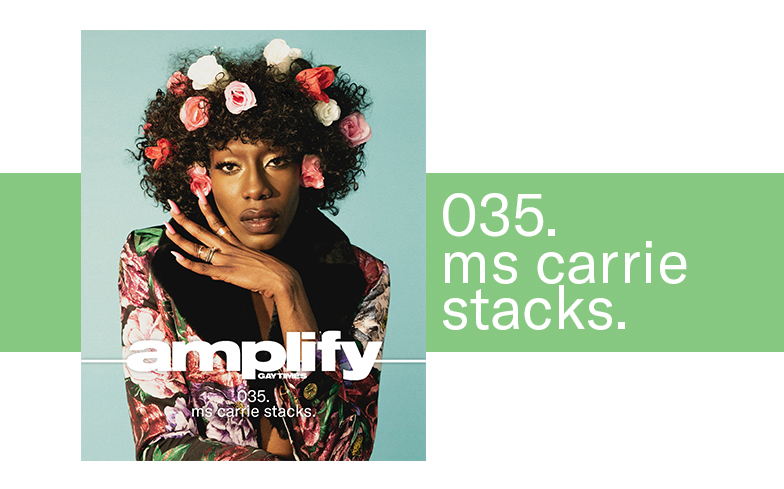
From enrolling at Central Saint Martins and discovering their queer voice through the art of fashion and personal style, Ms Carrie Stacks has become a formidable creative force – now rightfully synonymous with the London fashion and nightlife scene.
She’s also one of the co-founders of East London’s notorious party PDA, a space for the queer/non-binary PoC community to come together as one and showcase their true creativity and freedom. A place that champions the importance of the individual – something Carrie applies to her fashion, however challenging at times.
“I’ve never really been into labels. Now I’m starting to see it for what it really is, the industry is a business, and the business side of it is not about creativity, the business side isn’t life, it’s not love, it’s a toxic machine,” she tells of her experience as an out queer person of colour. But change is happening.
While we eagerly await her new project AQEM (Association for Queer Ethnic Minorities), we speak to Carrie about how we need to keep fighting for authentic diversity within the creative fields, how Pose is the new model of representation for many young queer kids, and why Marsha P. Johnson’s legacy will never fade.
You cited Marsha P. Johnson as a main reference for your Amplify photoshoot. What is it about Marsha’s story and her legacy that resonated with you?
Okay let me really give it to you. I only found out about Marsha quite recently, maybe two or three years ago, through my friend Misha who painted me a jacket for a shoot with Marsha on the back, and she asked if I knew her and I didn’t know. The fact that I didn’t know about her shocked the hell out of me, because I felt that was mother. I thought, ‘Oh my god, that is actually my grandmother’. Marsha was fabulous. Marsha was faaabulous! Everything about her to be honest, the way she looked, the way she spoke, the way people spoke about her, the smile, the whole thing. She understood what was going on so hugely, she understood that she didn’t deserve to be put under, and even though that was the reality around her, she managed to live in her dreams, which was quite fabulous I thought. She lived in her dreams and stayed quite true to them. I think it’s because of that that we’re able to even have conversations like this, or we’re able to meet on a shoot, it’s because she pushed! She stayed up in her cloud almost. Also, I don’t want to say anything sad about it but there is a whole sad narrative to the whole scenario, it didn’t land with her, she didn’t let that stick at all.
She never played the victim, it was like, ‘We’re going to do it, we’re going to grab life by the balls’.
Yeah, and also the fact that she was called Marsha ‘pay it no mind’ Johnson, that’s fabulous, that’s stuff we all need to hear, we need to hear that we’ve got to pay it all no mind, and to not focus any attention on all that stuff and not let any of that stuff follow us around, like stuff we’ve heard from parents or things that the world tells us, we’ve just got to listen to the voices inside and pay all that stuff dust. It’s such a fab message.
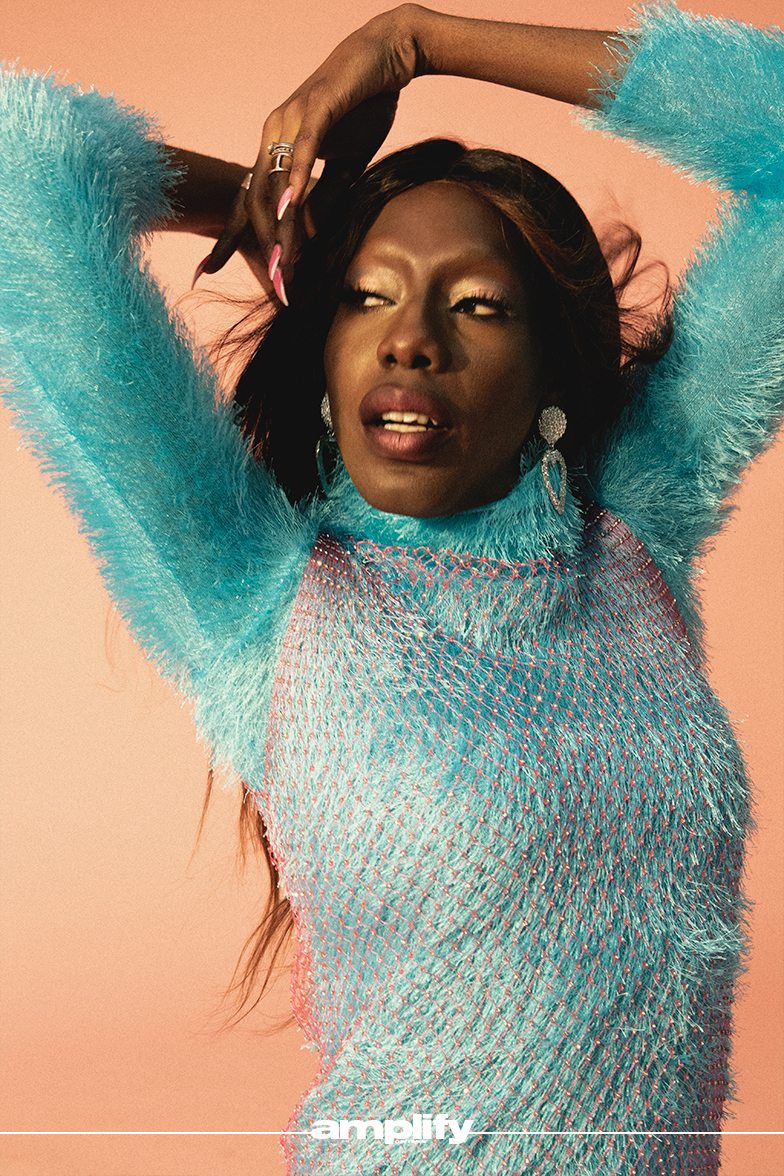
Mesh tank top, BEYOND RETRO.
You said you only discovered Marsha three years ago, do you think that stems from the education system in the UK? We’re entering Black History Month as we speak, yet these queer activists are hidden under the white, cishet male narrative.
It’s just embarrassing, it’s poor, obviously we can never really know exactly what happened but there are some ways. Silvia Rivero says it, Marsha was the first one to throw a brick, that’s all! That’s full stop. I was watching ‘The Old Gays on Grindr’ on YouTube, I watch a lot of YouTube, and they were talking about Stonewall, and I guess maybe when Stonewall had happened they were too young, they weren’t in the Stonewall Inn when the riots started, but even they were like, ‘We don’t know how it started’, they masked over it to leave it open for everybody’s judgement. When things like that happen, it’s just a bit cheap, it’s not the truth. So why put something that’s not the truth out there? I think it’s so wasteful. We’re all living it, so it’s important for all of us to understand what actually happened, and if you can get to the truth, that’s what we should push for instead of leaving it open to judgement, because then you can’t anchor down on anything and you can’t line things up properly.
If you leave it to interpretation people can rewrite history according to their views.
Literally! It’s not what’s actually happening. History is something that actually happened, ‘This lead to that, and this lead to that’, there’s a line. There’s an actual progression of things, and when you start leaving things out it just gets really messy, it gets confusing.
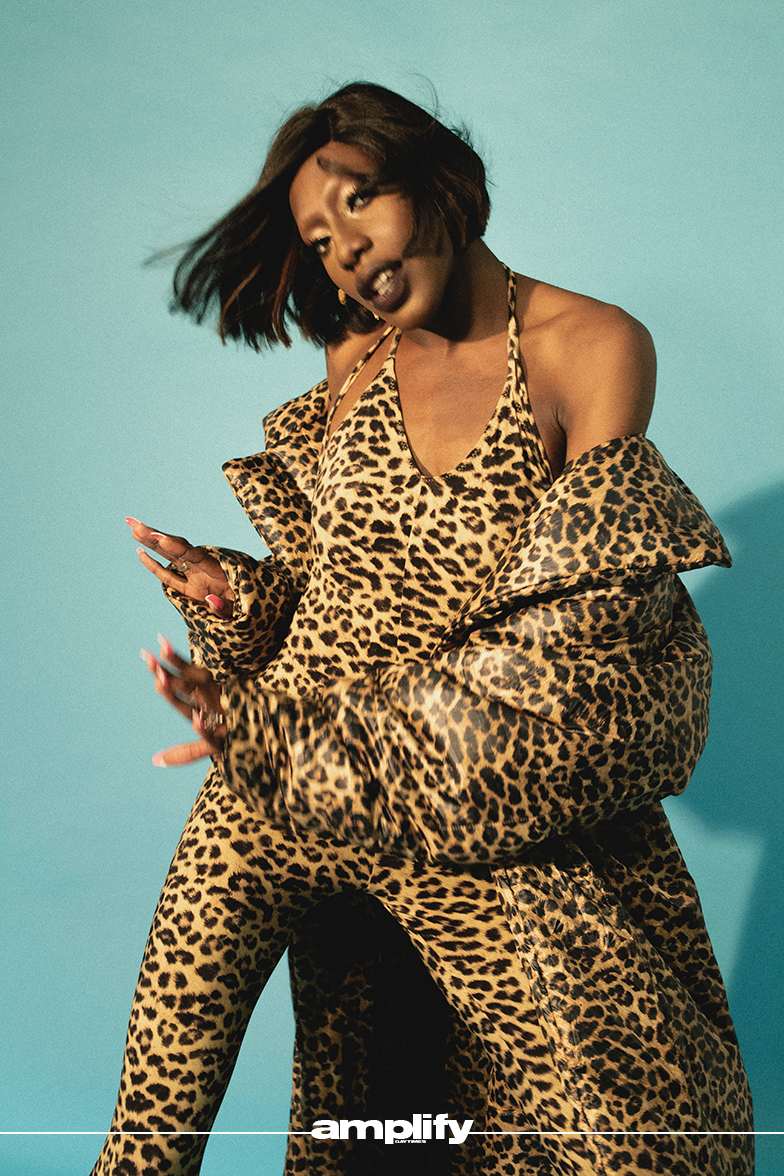
Does Marsha’s legacy translate in the way you carry yourself in everyday life?
When I was watching the documentary about it, the way I saw people speaking about her, I don’t remember the exact lines, but they spoke about her like this person that walked through the streets and you couldn’t look away. I’ve had this whole thing with dressing up and all this kind of stuff, there’s always been something I like about that. You can change someone’s mood by what you’re wearing as you walk past them. Something has been pushing me, I believe in lots of energy and I think it’s all one big cycle with what you’re here to do, and when you leave here, it doesn’t ever leave, it just carries on in its own kind of way. I think we have so much access to everybody and everything that’s gone and all the thoughts and things that were left here, you can feel it within yourself, and when I was watching that documentary I definitely felt it, I felt her, I felt like I understood what she was up to.
You mentioned walking down the street and leaving your mark, whether that’s positive or negative – how do you manage in terms of living in ‘passing’ culture, or society’s ideal images of femininity?
It’s a constant, I grew up and I didn’t really have any of that. I didn’t have access to any of that, I had a lot of stuff that was going on within me. Remember I said to you already, how much fashion or clothing and style helped me out, out of a lot of things, like family stuff and religion and all these kind of things. Clothing helped me find a route to freedom that I have now within myself and within my mind. When I was 17 or so I really wanted to wear skinny jeans, but I felt like I couldn’t wear skinny jeans because I was from Croydon. And then you feel bad because there are boys from school and they’re laughing at the skinny jeans, it’s stressful but it’s also really fab because I’m doing something! And it feels nice, I don’t know what clicked in me but it was a ‘Fuck it!’ moment, it was almost like I wanted the stress and I wanted the drama and I wanted to shake. You want the difference and you want to keep pushing past yourself.
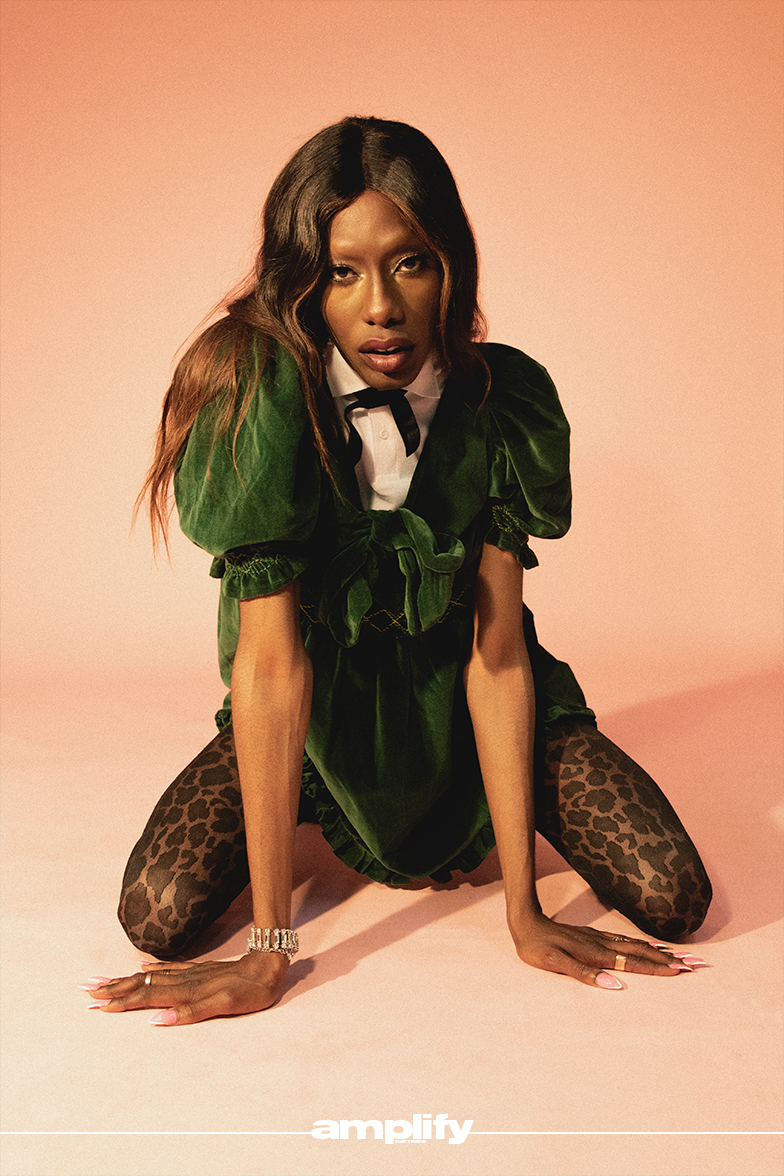
Tights, WOLFORD.
So what do labels mean to you? Especially in fashion there’s this fluid movement and people stepping out of the binary, do you relate with that?
When I studied at Central Saint Martins it was actually my tutor Carol that made me see something, and I’m so happy that she did show me these things early on because she saw it in me, she was like, ‘You’re not into fashion, you’re more about style’, and she separated the two for me. I remember this was in the first two weeks of my first year, and I still meet up with her now and we still speak, she’s an angel to me, she’s like another mother. I think she could see how toxic that place can be, you’re going to be in class with girls who have money and girls who do care about Margiela and all these kind of things. Thankfully it’s never really been about fashion for me, it’s always been about style. I’ve never really been into labels. Now I’m starting to see it for what it really is, the industry is a business, and the business side of it is not about creativity, the business side isn’t life, it’s not love, it’s a toxic machine. Also the industry really isn’t for us, the industry isn’t for people of colour, the industry isn’t for my aunties or for my cousins. It’s rich Europeans, that’s who it’s for, and this whole new thing, I guess it’s a new wave, a world wave about diversity and inclusion, obviously because it’s a trend the industry has to take into it, but it’s just laughable and it’s shady, it’s just funny. I’ve just realised it’s not something for me.
Pose has been quite revolutionary in America. Trans people and people of colour are visible on screen, in the writing rooms, in the directing chair. Do you think the UK will ever achieve something like that?
Yes baby, I’m writing it now. We’re writing the script as we speak! We’re living the script as we speak. Sis, do you know Pose is on BBC3? That’s insane. I remember when you had to sneak to watch Eurotrash or something. But imagine being eight or nine and sneaking into your room to watch Pose. I’m sure not many kids have to sneak to watch it, but imagine if you had to sneak to watch it and you got through the episode, do you know how empowering that is? If I had been sneaking to watch Pose and not Eurotrash, I’d be a better person, you know what I mean? I would be a fucking better person. I wouldn’t be on my knees as much as I am, I wouldn’t have all these complexes about sex, and stuff like that. Pose is very iconic, it’s very major, and obviously we can say it’s taken a long time, but like, actually it’s fucking perfect.
And the audience is ready for it!
Big time, the audience is ready for it and it’s actually really good, It’s good to see what they’ve done for the ballroom community. Ballroom is the most mind-blowing scenario ever. Ballroom is better than technology itself. Ballroom is insane, if you zoom out of it, it’s insane, it’s just too wild, how did these people manage it? Balls used to start at 5am! Obviously it’s through the hardships and stuff. I can’t even imagine the legalities of it all. But it’s wild and the progression from where it started to where it is now, it’s informed pop culture so much. That’s part of the insanity and the shade of it all, It’s like a huge spiral. The fact these people are at the bottom but at the top at the same damn time is wild. They’re the most creative, then they have the least. Trans women are the most beautiful, as you’ve lived a whole lot of years not being the person you want to be, and now you can be who you want to be. So by the time you get to three or four years in, of course you’re going to be beautiful. Of course you’re going to fight so hard. The shade on women, and women being nervous and women not getting their dues and stuff, that’s because men are terrible, and men never want to give it to women and all these weird things, but as long as we keep not saying what’s actually going on then it gets clouded.
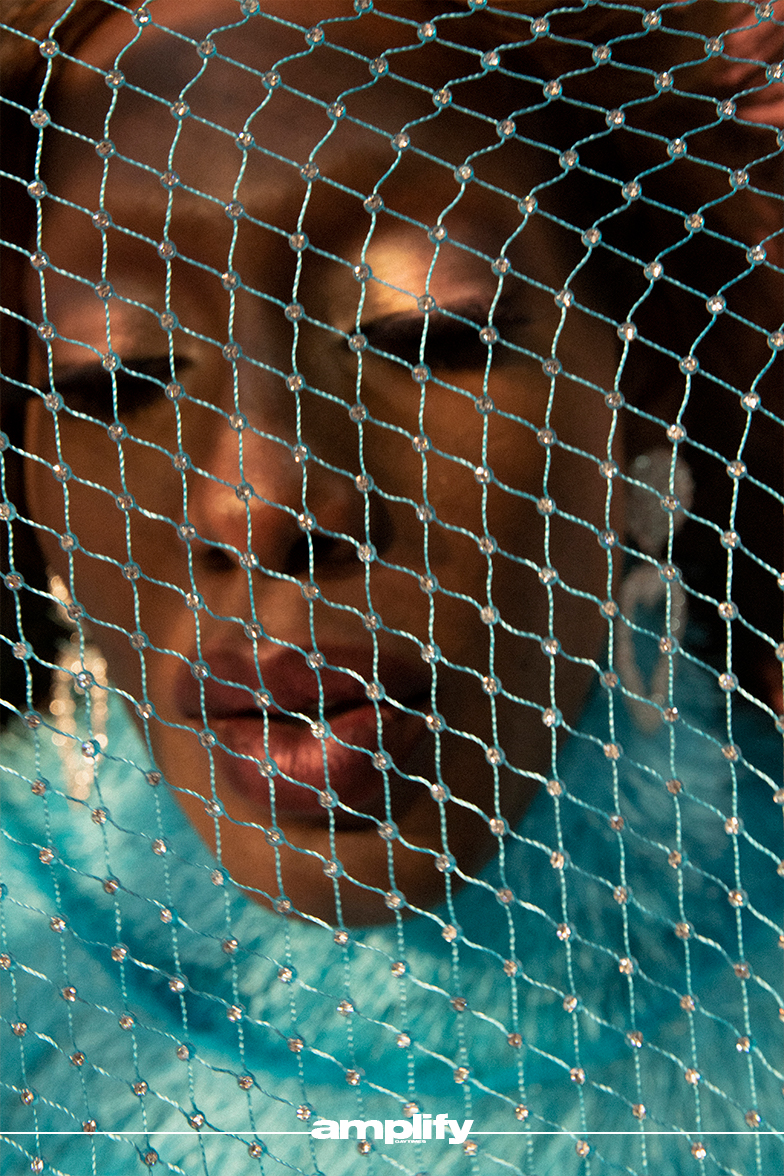
Mesh tank top, BEYOND RETRO.
Family is a huge part of your DNA, how did you find that journey of coming out?
I still haven’t navigated that and I didn’t do that. That’s why I talk about the use of clothing. I never came out. I forced people to have conversations with me by the way I would dress. I started getting more feminine in my dress, and it was always under the premise that I’m going to do what I want to do. So I never sat anyone down, but if you do want to say something you should say it. I’m quite antagonistic in that way. Even with my parents and siblings, I never said anything to them. My mouth is like a tap, and if you can get me in the right mood, I will tell you. But I’m not going to explain myself, that never sat right with me. I guess it comes from a place of not being quite sure, also not really understanding how fine everything is, and how okay everything is. With African parents, especially African Christian parents, I don’t have a voice. I didn’t know I had a voice. I thought my mum and dad knew everything, but they don’t, they’re just human and obviously they’re trying to protect me, but I thought they had the A to Z of everything.
We had a complete team of people of colour for your shoot. Do you think we’re coming to the point where if the subject is a PoC then the team behind should reflect that?
Sis, it’s easy for us, and when they’re on their own it’s easy for them too. It’s like normal, being back home. It’s like kicking with your friends. We can be ourselves here and be okay here. We have this link here, and this bond here, and there’s nothing to shy away from. It’s a good and fine thing. It’s better than us not being able to come together and us being the only one inside the room, and better than having one white person being in the room feeling awkward. It’s just better. That’s the situation we’re in now, let’s not fight amongst ourselves.
It’s a natural gravitation of like minded people. On a final note – who is Ms Carrie Stacks?
She is whoever she wants to be. Ms Carrie Stacks is fun, she’s flirty, she’s streamlined. Miss Carrie is carrying stacks and that’s for sure. She’s carrying the stacks, miss thing. We getting these stacks so we can be free and enjoy ourselves.
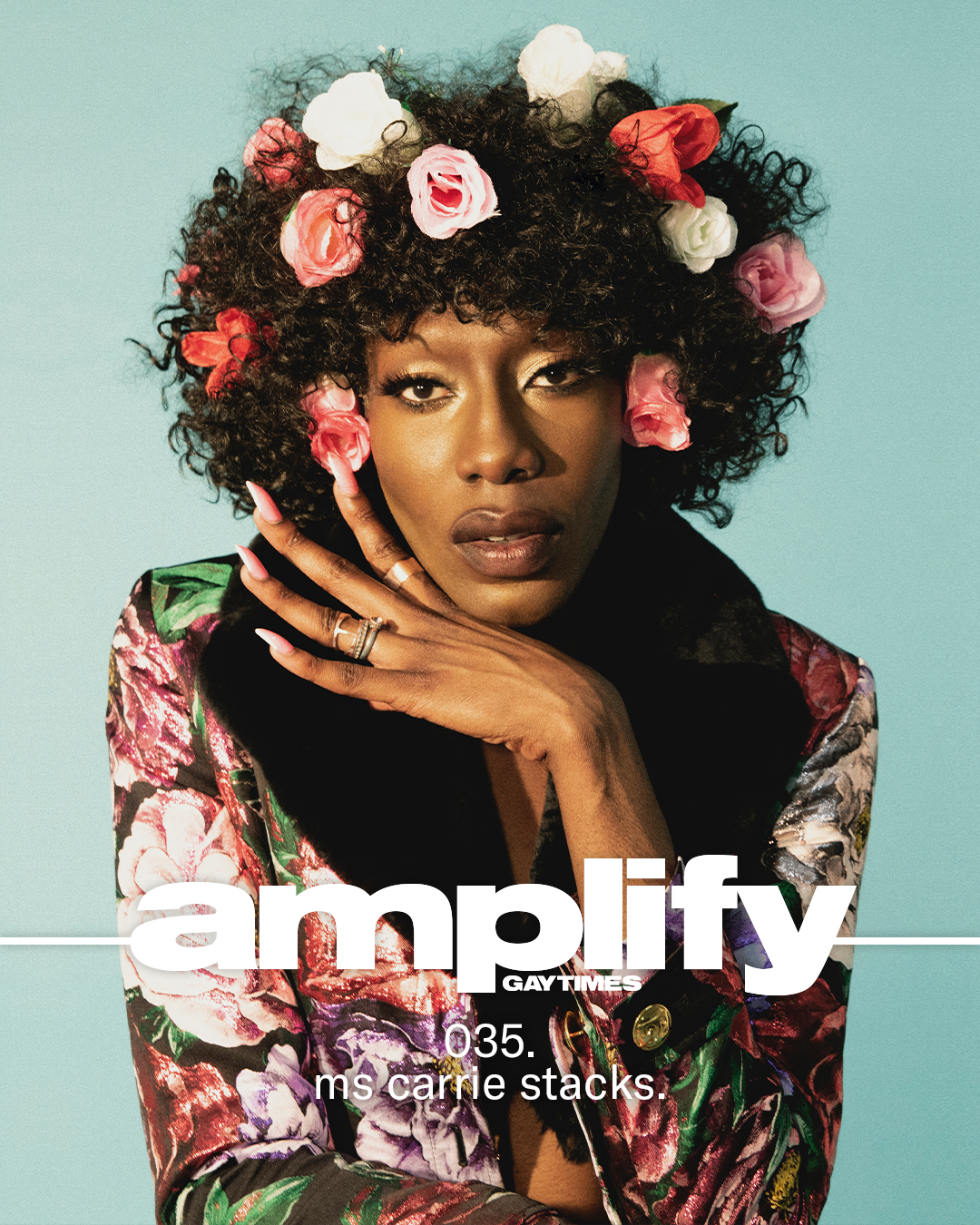
Photographer Hidhir Badaruddin
Fashion & Words Umar Sarwar
Hair Carl Campbell
Makeup Sogol Razi
Photography Assistant Delali Ayivi
Fashion Assistants Miranda Mikkola and Solly Warner



